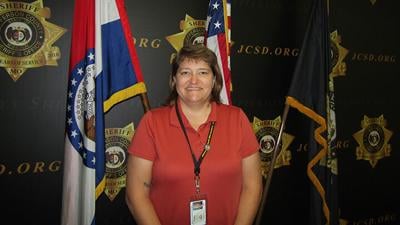Lisa Flamion was called into action not long after being hired as the Jefferson County Sheriff’s Office’s first mental health coordinator.
Just two weeks after getting the job, she was called on Aug. 13 to help deputies with a call involving a mental health crisis, when a 28-year-old High Ridge man who was wanted because of a probation violation barricaded himself into a house on Fiedler Lane in unincorporated Fenton. After a near two-hour standoff, the man was arrested without further incident, the Sheriff’s Office reported.
She also responded to a call Monday when a 46-year-old Arnold man reportedly shot a woman and had a nearly nine-hour standoff with police at an Arnold-area home.
Sheriff’s Office spokesman Grant Bissell said she did not communicate with anyone in the home during the standoff as negotiators handled the incident, which ended peacefully, but she was available if needed.
Flamion, who started in the newly created job on July 30, was positioned with the negotiation team away from the home during the standoff.
She said she hopes to continue helping deputies dealing with Crisis Intervention Team (CIT) calls.
“I want to be there in the moment when it is going on and follow-up a couple of days later,” said Flamion, 30, of Brentwood. “Then I can say I was on the scene when this was going on and ask how things are going now. I can also get an idea of how they presented in that moment and how they are presenting now. I can see if they have stabilized, still in crisis or thinking rationally. I would prefer to be involved firsthand as much as possible. That is a top priority to be out there on the scene in the moment.”
Flamion grew up in High Ridge and graduated from St. Pius X High School in Crystal City.
She said she is aware of what is at stake when law enforcement officers encounter someone suffering from a mental health crisis.
Her brother, Michael Flamion, a former De Soto Police officer, was paralyzed from the neck down when he was shot during a July 2016 traffic stop while working as a Ballwin Police officer.
In May 2019, Antonio Taylor, who was accused of shooting Michael Flamion, was deemed mentally unfit to go to trial.
“I never stop thinking about my brother and what happened,” Flamion said. “That in a way shaped where I am today. I think about what would have happened if someone got through to that man before he made the decision to pull the trigger that day.
“I feel the man who shot him got shortchanged in a lot of ways. He was obviously very ill, but what would his life have looked like if he was in some sort of sustainable treatment? Where would he be now? That is where some of my drive comes from. I want to be as available as possible to stop situations like that.”
Creating the position
Sheriff Dave Marshak said he created the coordinator position because of the high volume of mental-health calls deputies are responding to in Jefferson County.
He said deputies respond to an average of more than 700 calls a year dealing with suicidal subjects or mental health crises. And while 103 of the Sheriff’s Office’s 166 deputies are trained in crisis intervention, Marshak said the coordinator position introduces a new resource to help them handle those calls.
“Law enforcement officers are the ones responding to mental health calls, and despite all of the training we receive, we cannot replicate the training and experience Lisa brings to the organization,” Marshak said.
Flamion, who will be paid a $77,500 annual salary, has a master’s degree in school and professional counseling and has worked in crisis counseling for the past 10 years.
Previously, Flamion was the manager for a 911 mental health co-responder program that launched in St. Louis in February. In that program, Flamion’s employer, Behavioral Health, teamed mental health professionals with St. Louis Police officers to respond to some 911 calls.
Before that, she was a community mental health liaison for St. Louis County Police.
Marshak said the Sheriff’s Office received 19 applicants for the coordinator position and six candidates were interviewed.
“I met Lisa at a conference in Seattle three years ago when she was with (Behavioral Health) and assigned to St. Louis County’s Crisis Response Team,” Marshak said. “I wanted to implement some of the follow-up strategies we discussed so it’s been on my mind for years. I was already impressed with her and through conversations with her former unit commander, learned she had taken a promotion leading St. Louis city’s diversion program but was interested in working for us.
“While there were some great candidates who applied, we knew Lisa would hit the ground running with minimal guidance. It was obvious to the interview panel she was the right fit for our team.”
Flamion said she is looking forward to serving the county.
“I always want to take care of my home community,” she said. “The folks out here provided excellent support when my brother got hurt. They never forget he was a De Soto officer. This is a way to give back to those folks. I am grateful for the opportunity and the vision Sheriff Marshak has for this position.”
Dealing with crises
It’s become common for big police departments to employ mental health professionals, but full-time mental health coordinator positions are rare among smaller municipal departments and rural sheriff’s offices.
Marshak said the creation of the coordinator position is just another tool he’s added to help the Sheriff’s Office deal with mental health issues.
Two years ago, the Sheriff’s Office hired Joshua White to lead the mental health services at the Jefferson County Jail; connect discharged inmates with community mental health agencies and long-term substance abuse treatment facilities; and help former inmates with obtaining medical insurance.
Through July of this year, there were 997 requests from inmates for mental health assistance.
“Dr. Josh White has been an incredible asset screening inmates and providing ongoing support,” Marshak said.
Marshak said that while the Sheriff’s Office is hiring more mental health services professionals, that doesn’t mean they’re replacing deputies.
“Lisa’s role will be one supporting our officers and organization to ensure we are doing the best job possible servicing our community,” Marshak said. “That’s a completely different scenario than the defund or replace police scenario we see in other organizations.
“I don’t know what the right number of health professionals would be, but one is not enough. We must carefully balance our needs for mental health professionals versus our other responsibilities.”




